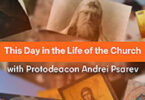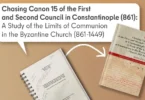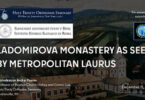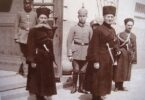On March 6, immediately after the Russian Federation began its military action against Ukraine, I issued a personal statement. In it, I said that historians are all about “the big picture”, which it takes a fact-based perspective to understand. The historian must not succumb to outside pressure to issue hasty condemnations of the actions of certain public figures or political leaders.
On the latter count, my position has not changed. That said, I do have some preliminary conclusions to offer about our new reality.
Both in Russia and in Ukraine, Orthodoxy has come to be perceived as a philosophy of opposition to civil society. This has to do with the historical entanglement of Orthodoxy and Empire and the ambivalent relationship between the two.
The recent past shows that when the Church is integrated into the apparatus of Empire, it has to “pay the empire’s dues” when the latter ceases to exist. Therefore, the frontier of the conflict now is about Russia, as an empire, not ceasing to exist and becoming a self-sufficient civilization in a system of moral and ethical values in which Orthodoxy would occupy an important place. The fact that the majority of citizens of the Russian Federation support the domestic and foreign policies pursued by President Putin is an impressive fact for understanding the processes taking place there.
The collectivist ideology currently preached in Russia has its strengths, in that it consolidates society and strengthens the position of the Church. But it also has serious shortcomings: the absence of dialogue and de facto rejection of the system of “checks and balances”, without which a state can devolve into tyranny.
All the Ecumenical Councils took place in the Eastern Roman Empire. Our whole way of life is imbued with Byzantium. But the world has changed, and in this, Russia is no exception. Under these conditions, the first three centuries of Church history, when Christians lived in a non-Christian society, might serve as a more promising point of reference for us in seeking answers to the challenges of our times than the imperial period of the history of the Church.
We live in interesting times. On the one hand, the Russian Church Abroad now finds itself in the shoes of the Moscow Patriarchate parishes during the Cold War. (Metropolitan Anthony of Sourozh never ceased liturgical commemoration of the Moscow Patriarch in London.) On the other hand, in canonical terms, the Ukrainian Orthodox Church has gone over to the position that the ROCOR was in at the time. As long as we continue to be called the “Church of Russia”, this new reality can help us to take a more responsible attitude to what is happening in Russia: on the one hand, maintaining a spiritual connection with the Mother Church and on the other, beginning a thoughtful, conciliar conversation within the Russian Orthodox Church outside of Russia about the times in which God has led us to live.












Some may be seeing or hearing what they perceive to be a divine symphony being played out with the current union of the Putin regime and the Moscow Patriarchate – and by extension the ROCOR.
We should be reminded that St. John of Shanghai and San Francisco warned against the apostasy of the Church where “many bishops will betray the faith, and point to the wonderful position of the Church as justification.”
I was joyful when the Ukrainian Orthodox Church escaped from the grasp of the Putin-MP Union, but almost completely disheartened by the silence of the ROCOR (bordering on assent?) of the fratricidal invasion and occupation of the country of Ukraine that precipitated the UOC’s flight.
The ROCOR Synod of 1938 stated: “[E]very attempt to arrive at a legalization during the epoch of apostasy inescapably turns the Church into the great Babylonian whore of blasphemous atheism. The near future will confirm our opinion and prove that the time has come in which the welfare of the Church demands giving up all legalizations, even those of the parishes. We must follow the example of the Church prior to the Council of Nicaea, when the Christian communities were united not on the basis of the administrative institutions of the State, but through the Holy Spirit alone.”
What will the ROCOR Synod of 2022 decide? Will they be content to bask silently in the reflected glory of the mighty Moscow Patriarchate or will ROCOR recover its lost heritage as the conscience of Russian Orthodox Christianity?
Rather, ROCOR finds itself “in the shoes” of the ROCOR of 1936 when it believed that Nazi Germany was the blessed vehicle on which it would ride to victory into Russia in order to overthrow (subjugate?) its then-enemy, the Moscow Patriarchate. ROCOR blessed the Nazi authorities and prayed for the victory of its armed forces.
To 1936 ROCOR’s credit however, its Metropolitan had reservations about his flock’s embrace of fascist ideas.
Today’s ROCOR who has hitched its dreams of a Holy Russian Empire onto the ambitions of Putin should take note of its own history so as not to fall into the same error and sins of its predecessors: ROCOR was wrong to place its hope on a fascist dictator then — it is wrong now.
From ROCOR Studies:
On March 13/26, 1936, the Synod of Bishops of the ROCOR with Metropolitan Antony presiding, having heard the report of Bishop Tikhon of Berlin and Germany on the matter of the commemoration of the German authorities, resolved: “To instate the following forms of commemoration of the German authorities in the Diocese of Germany, after the Constitution of this diocese has been ratified and published. 1) At the Great Litany: ‘For the Christ-loving authorities of the German nation, its Government and armed forces, let us pray to the Lord.’ 2) At the Litany of Fervent Supplication: ‘Let us again pray for the Christ-loving authorities of the German nation, for their dominion, victory, persistence, peace, health, and salvation, that the Lord God may further stand by and show his favor to them and bend every enemy and adversary under their feet.’ To send His Eminence Bishop Tikhon an ukaze to this effect.”
Metropolitan Anastasy Gribanovskii,
who became the First Hierarch of the ROCOR after the death of Metropolitan Antony, expressed his gratitude to Reichskanzler Adolf Hitler for the construction of the cathedral church of the ROCOR Diocese of Germany in Berlin; however, he displayed a negative attitude toward how some Russian émigré figures were toying with fascist ideas. Vladyka Anastasy said that “fascism is incompatible with Christianity because it suppresses personal spiritual freedom, without which the spiritual life of Christianity is not possible.”
Again, on July 15, 1936, the Metropolitan clearly stated his stance against fascism at the Saint Vladimir Festival in Belgrade:
“Fascism as a type of state-political structure can never be our ideal. It is founded upon principles of compulsion which extend to a person’s very ideology. Yet without freedom, there can be no moral heroism nor moral responsibility. Without either of the latter a Russian Orthodox state is also unthinkable for us.”
https://www.rocorstudies.org/2019/12/07/the-russian-orthodox-church-outside-of-russia-and-the-holocaust/
Let’s first denazify our self before we attempt to denazify our neighbor. (Gospel of St. Matthew 7:5)
Our “new reality” is that the Jews and Masons that everyone warned us about are taking over the world and subjugating the Church under their thumb – this seems obvious to me, but no one wants to speak openly about it, for fear of being branded some kind of “conspiracy theorist” or worse, “for fear of the Jews”…
The entire world is governed now by a supranational Jewish banking cartel, and the majority of Orthodox hierarchs seem to be compromised by this entity. Our ROCOR Synod of old warned us about this but nowadays, seems intent on ignorance. I read the recent statements of the Synod and I sit in shock. Is this the same Church that condemned the Masons, anathematized Ecumenism, and correctly identified the Bolshevik revolution as a Jewish Talmudic operation? I don’t understand it at all. Has political correctness bound the tongues of even the most faithful Orthodox bishops?
Even some of our ROCOR bishops accepted the COVID “vaccines”…